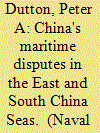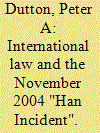| Srl | Item |
| 1 |
ID:
133060


|
|
|
|
|
| Publication |
2014.
|
| Summary/Abstract |
China pursues its security through interior strategies that involve the development of rings of security around central areas of national interest. The Chinese have long felt vulnerable from the sea, and their current maritime strategy seeks to reduce that vulnerability by extending a ring of maritime control around China's periphery. China pursues this control through a combination of forcestructure development and legal assertions. Tensions arise because China's strategy conflicts with the territorial claims, resource interests, and security concerns of other states in East Asia. China's strategy also causes friction with the United States, which relies on freedom of navigation in maritime East Asia for American security interests and which must reassure regional allies and partners that American security guarantees are meaningful. In order to ensure the position of the United States in East Asia, American policies must focus on maintaining the region as an open, maritime system. This requires continuous development of technological advantages to ensure that the center of power in Asia does not migrate from the maritime domain to the continent. It also requires the United States to support the ability of allies, friends, and partners to resist China's nonmilitarized coercion, as well as to reinforce the normative structure that supports the efficacy of maritime power in the region and around the globe.
|
|
|
|
|
|
|
|
|
|
|
|
|
|
|
|
| 2 |
ID:
072475


|
|
|
|
|
| Publication |
2006.
|
| Summary/Abstract |
The Ishigaki Strait is an international strait by the terms of the United Nations Law of the Sea Convention, but for national security reasons it is not recognized as such by the Japanese government, which advocates a narrower definition of what constitutes an international strait in which the right of transit passage applies. China, as a traditional land power with tradinationally weak maritime forces, has historically agreed with Japan's limitations on access through such straits. As China's maritime strength grows, it has increasingly greater interest in access to ocean spaces. However, because of tension and poor coordination between its military and foreign policy bureaucracies, China missed an opportunity during the diplomatic crisis in November 2004 to align its position on maritime law with its strategic interests.
|
|
|
|
|
|
|
|
|
|
|
|
|
|
|
|